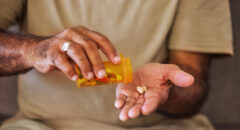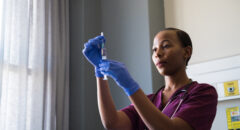
Stopping sexual activity can affect both physical and emotional well-being, with potential impacts on hormone levels, stress, sleep, and immune function. While not having sex doesn’t inherently lead to health problems, it can disrupt the release of hormones associated with stress reduction and relaxation, potentially affecting sleep and mood. So if you’re either going through a dry spell in the bedroom, taking a self-proclaimed sabbatical from “getting some”, or just simply being abstinent, you may start to notice some changes in your body. Here’s what to expect.
1. Your Dreams Change
You may dream more.
Women who aren’t having sex regularly will find that their body will remind them what they’re missing in their sleep.
This will especially happen if your sex life is not only at a standstill, but you’ve also given up on masturbating.
Researchers had it easy when they were studying nocturnal emissions in men, the most obvious reason being that men have erections that are visible and ejaculate as proof that they’ve climaxed.
With women, it was more complex. Researchers found that 37 percent of women will have a wet dream before the age of 45 and that they’re most common in women between the ages of 40 and 50.
So, if it’s been a while since you’ve gotten lucky, you can expect a pretty vivid dream in the near future.
2. Your Libido Changes
You may have a loss of libido.
For some people who refrain from sex, they begin to feel more sluggish, with less vitality and hunger for sex. It’s sort of like the saying, “out of sight out of mind.”
When your body stops having the feelings associated with orgasms, it simply adjusts to not being given those feelings and stops seeking them out.
3. Your Urinary Tract Infections Change
You may lower your risk of UTIs.
It might not be a surprise that the risk of sexually transmitted infections goes down if you’re not having sex, but the rates of urinary tract infections may decrease as well.
But this depends on the kind of sex you’re having. Intercourse may really be responsible for potentially increasing the risk of recurrent bladder infections, due to the spread of bacteria that can occur.
Eighty percent of UTIs in premenopausal women occur within 24 hours of having sex, and as the journal, American Family Physician stated, “Frequency of sexual intercourse is the strongest predictor of recurrent urinary tract infections.”
If you’re not having intercourse, you avoid these risks.
4. Your Mood Changes
You may feel happy or unhappy.
Certainly sex releases endorphins and happy hormones that give a sense of wellbeing that you might no longer get.
From a psychological point of view, someone might feel a responsibility to have sex – they feel that they should be having it. If they are not, that could also lead to a low mood.
Sex is part physical, part mental. When people have sex they’re usually having skin-to-skin contact, and this kind of contact is the first primal way we as humans get comforted [as babies with our mothers.
Sexual connection give partners loads of skin-to-skin caressing and touching and can help to regulate one another’s moods, through the release of the feel-good hormone oxytocin.
Without the benefit of these natural pick-me-ups, you might be prone to feeling low—but that doesn’t mean you’ll become clinically depressed.
Although studies have shown that depression and a lack of sex are linked, this reflects an association, not cause and effect.
While it is true that sex can help boost your spirits through mood-elevating endorphins, it’s not the only way.
So instead of relying on sex or some other outside factor to make you happy, replace that with a self-assured feeling that happiness comes from within.
5. Your Immune System Changes
You may not be able to fight off colds/flu as well
Researchers at Wilkes-Barre University in Pennsylvania found that sexually active people take fewer sick days than their celibate counterparts, in part due to higher levels of the anti-body immunoglobulin A (IgA), which your body releases during sex. In 2015, two studies found that regular sex boosts women’s immune systems, in particular ” this is nature’s way of priming your body for pregnancy and safeguarding against any infections or illnesses that could lessen your chances of getting pregnant.
6. Your Heart Changes:
You might lose a bit of heart health.
Sex can be good for your heart, according to research. It’s aerobic exercise after all, and that’s good for you. One expert says a healthy sex life may decrease your risk of having a heart attack.

Be sure to put all of that unused energy to good use by hitting the gym. It will not only keep your body in shape but will reverse many of the negative effects associated with stopping sex, including your mood.
And last but not least…
You will contract less sexually transmitted diseases. Yes, of course staying away from sex can guarantee you lower your risk of STDs/STIs, but you still need to watch out for who you kiss. Here’s why…
Now on the other side of the spectrum, there are a number of benefits and risks to your body that take place when you’re actively having sex.
There are six common injuries that can occur while being sexually active, including fractures and other forms of strain on your body. You can read more about those risks, and how to prevent them, here.









